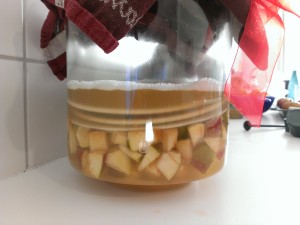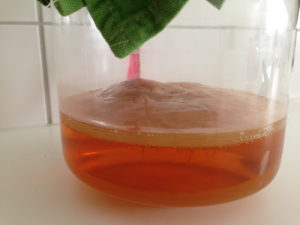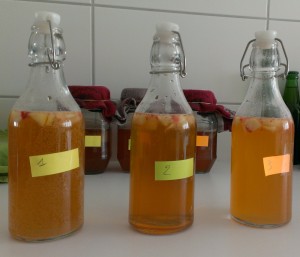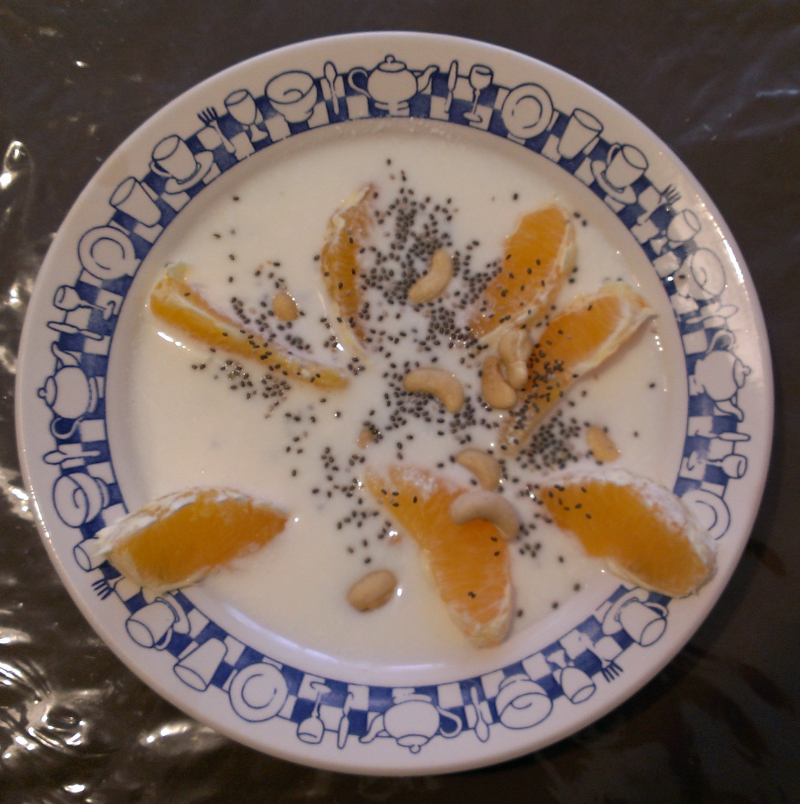What is mead?
Mead is an alcoholic beverage produced by adding fruit to a water and honey mix. The ratios of water and honey vary depending on the fruit you are using. The first stage is aerobic, meaning that oxygen will be able to circulate and stimulate the micro organisms on the fruit peel and/or in the air. The second stage, after fierce bubbling has subsided, is done with less oxygen. The beverages are closed off by an air-lock so that the risk for developing acetic acid is minimal (the latter process requires oxygen and a larger surface area). At a time point of your chosing, the fermentation can be broken off.. in other words, you can bottle the mead and drink it, whenever you feel like it
The first stage is aerobic, meaning that oxygen will be able to circulate and stimulate the micro organisms on the fruit peel and/or in the air. The second stage, after fierce bubbling has subsided, is done with less oxygen. The beverages are closed off by an air-lock so that the risk for developing acetic acid is minimal (the latter process requires oxygen and a larger surface area). At a time point of your chosing, the fermentation can be broken off.. in other words, you can bottle the mead and drink it, whenever you feel like it
 The first stage is aerobic, meaning that oxygen will be able to circulate and stimulate the micro organisms on the fruit peel and/or in the air. The second stage, after fierce bubbling has subsided, is done with less oxygen. The beverages are closed off by an air-lock so that the risk for developing acetic acid is minimal (the latter process requires oxygen and a larger surface area). At a time point of your chosing, the fermentation can be broken off.. in other words, you can bottle the mead and drink it, whenever you feel like it
The first stage is aerobic, meaning that oxygen will be able to circulate and stimulate the micro organisms on the fruit peel and/or in the air. The second stage, after fierce bubbling has subsided, is done with less oxygen. The beverages are closed off by an air-lock so that the risk for developing acetic acid is minimal (the latter process requires oxygen and a larger surface area). At a time point of your chosing, the fermentation can be broken off.. in other words, you can bottle the mead and drink it, whenever you feel like itDo fermented products contain alcohol?
That depends on what you are fermenting, and hence which micro organisms are involved.
- If you are fermenting fruits, the sugars in the fruits will be converted to alcohol by the action of yeasts => typically mead and ciders
- If you are fermenting milk, the milk sugars will be degraded by the kefir grains and there will be no alcohol => typically kefir, yoghurt ..
- If you are fermenting sweetened tea using the Kombucha mother, some of the sugars will be converted to alcohol. Overall the alcohol percentage of kombucha will be maximum 2% (usually it's much less)
How big is the risk that I'm growing something that'll make me ill?
Usually, the risk is not that big.
Especially for the kefir, meads, pickling, and maybe also kombucha, the environment that is created by these organisms is such that harmful ones will not want to grow there.
Basic and consistent hygiene will be sufficient to be able to produce healthy cultures, keeping you healthy as well 😉
When you see something suspicious and you are not entirely sure, you can always throw it away. I guess here as well common sense should be used: e.g. red mold in a kefir culture is not what you want..
On the other hand, when producing mead or pickling, there may be some surface mold at the interface between the air and liquid. Usually this is not a big deal and it can be removed.
Do I need special equipment?
That depends on what kind of fermentation you are into..
At the basic level, you do not need anything special, whatever is lying around in your kitchen will do. I would opt for glass or ceramics (as plastics may leach and metals depending on the type may not be productive for the microorganisms)
If you are going at it more seriously, then it would make sense to buy larger items in terms of jugs, carboys, air locks, (construct your own) incubators.
What are probiotics ?
Probiotics are micro organisms that are believed to promote the health of one's intestinal flora as well as overall health.
There are many studies that have investigated the health benefits that foods exposed to these organisms provide. Some of the blog posts refer exactly to this, so please feel free to have a look at opening page
I want to give it a try. How shall I proceed?
What is kombucha?
Kombucha is fermented tea.  It is produced by a heap of micro organisms, bacteria as well as yeast cells, that live together in the SCOBY (Symbiotic Culture Of Bacteria and Yeast) mother.
Although it is often referred to as a mushroom, it is not a mushroom: A mushroom is -per definition- a flowering body of the mycelium that grows in the earth. Even though mycelium might be related to yeast, they are still distant cousins, in terms of the family tree).
The SCOBY mother looks like a floating disk, produced by and for the culture. It functions as a protective layer, keeping the pH of the tea right, preventing dehydration and posing as physical barrier to impede other unwanted guest microbes.
Usually sweetened tea is added to the mother floating in some old kombucha. The brew is left to ferment at room temperature, covered with a cloth to prevent contamination, and usually would enjoyed about 14 days later.
The longer it ferments, the more 'vinegary' it will taste, so if you prefer still a bit of sweetness, you can try it after a week (or even sooner, up to you).
It is produced by a heap of micro organisms, bacteria as well as yeast cells, that live together in the SCOBY (Symbiotic Culture Of Bacteria and Yeast) mother.
Although it is often referred to as a mushroom, it is not a mushroom: A mushroom is -per definition- a flowering body of the mycelium that grows in the earth. Even though mycelium might be related to yeast, they are still distant cousins, in terms of the family tree).
The SCOBY mother looks like a floating disk, produced by and for the culture. It functions as a protective layer, keeping the pH of the tea right, preventing dehydration and posing as physical barrier to impede other unwanted guest microbes.
Usually sweetened tea is added to the mother floating in some old kombucha. The brew is left to ferment at room temperature, covered with a cloth to prevent contamination, and usually would enjoyed about 14 days later.
The longer it ferments, the more 'vinegary' it will taste, so if you prefer still a bit of sweetness, you can try it after a week (or even sooner, up to you). You ferment the brew for longer, and experiment by adding some fruits, or herbs to spice it up.
You ferment the brew for longer, and experiment by adding some fruits, or herbs to spice it up.
 It is produced by a heap of micro organisms, bacteria as well as yeast cells, that live together in the SCOBY (Symbiotic Culture Of Bacteria and Yeast) mother.
Although it is often referred to as a mushroom, it is not a mushroom: A mushroom is -per definition- a flowering body of the mycelium that grows in the earth. Even though mycelium might be related to yeast, they are still distant cousins, in terms of the family tree).
The SCOBY mother looks like a floating disk, produced by and for the culture. It functions as a protective layer, keeping the pH of the tea right, preventing dehydration and posing as physical barrier to impede other unwanted guest microbes.
Usually sweetened tea is added to the mother floating in some old kombucha. The brew is left to ferment at room temperature, covered with a cloth to prevent contamination, and usually would enjoyed about 14 days later.
The longer it ferments, the more 'vinegary' it will taste, so if you prefer still a bit of sweetness, you can try it after a week (or even sooner, up to you).
It is produced by a heap of micro organisms, bacteria as well as yeast cells, that live together in the SCOBY (Symbiotic Culture Of Bacteria and Yeast) mother.
Although it is often referred to as a mushroom, it is not a mushroom: A mushroom is -per definition- a flowering body of the mycelium that grows in the earth. Even though mycelium might be related to yeast, they are still distant cousins, in terms of the family tree).
The SCOBY mother looks like a floating disk, produced by and for the culture. It functions as a protective layer, keeping the pH of the tea right, preventing dehydration and posing as physical barrier to impede other unwanted guest microbes.
Usually sweetened tea is added to the mother floating in some old kombucha. The brew is left to ferment at room temperature, covered with a cloth to prevent contamination, and usually would enjoyed about 14 days later.
The longer it ferments, the more 'vinegary' it will taste, so if you prefer still a bit of sweetness, you can try it after a week (or even sooner, up to you). You ferment the brew for longer, and experiment by adding some fruits, or herbs to spice it up.
You ferment the brew for longer, and experiment by adding some fruits, or herbs to spice it up.What is kefir?
Kefir is fermented milk, obtained by adding kefir grains to milk (or soy milk or coconut milk). The grains function as a 'house' for the bacteria and yeast cells and each part of the kefir grain has their region with specific micro organisms (so there's a difference between the organisms choosing to live on the outside versus inside of the grain)
Fascinatingly, if you start from scratch and have only the bacteria and yeast cells, you will not produce a grain!
The process usually lasts 24-36 hours, depending mainly on the temperature. The longer it is left, the sourer the kefir will become.
It is often compared to non-users as 'similar to yoghurt' though it is quite different (Yoghurt can also be grown at home btw)

Do I have to take any precautions in terms of hygiene when I'm working with these organisms?
Yes you will have to work hygienically, but there is no need for laminar air flow cabinets and gloves and lots of ethanol.
The typical soap and water for thoroughly cleaning your equipment, work space and your underarms will be just fine. I would advise to add boiling water for 10 minutes to glass jars and any other recipient that will contain any culture.
Especially for milk kefir this is essential: at least weekly all recipients should be thorougly cleaned and cooked to make sure that there is no chance for any sort of mold to grow.
Other than that there are no specific precautions needed.
What is ginger beer?
Ginger beer or ginger lemonade to be precise, is a probiotic drink that is based on the microorganisms present on the surface of the ginger root.
The starter culture is made by adding sugar and grated ginger (unpeeled) to water, swirling it regularly, until the liquid becomes bubbly. This is then added to a 'lemon - ade' aka lemon+water+sugar to ferment for a couple of days.
It is a healthier alternative to lemonade, providing benefit for the gut flora
Do you have another question that’s not in this list?